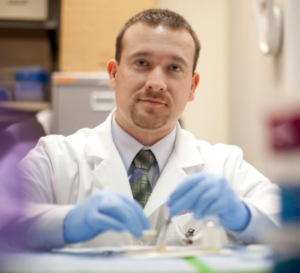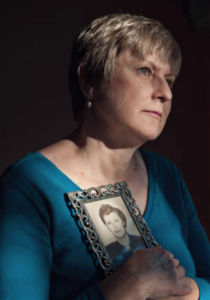March 11, 2017:
March is the time to take stock of the number two ranking cause of cancer deaths in the United States: colorectal cancer (cancer of the colon or rectum). Since this time last year, it is estimated that 140,000 Americans were diagnosed with colorectal cancer, and more than 50,000 people died from it. During Colorectal Cancer Awareness Month, researchers, clinicians, survivors, and patients unite with the common purpose of discovering hope for those facing this cancer.
Evaluating a Therapy for Rare Midgut Tumors

Al Benson, MD, professor of Medicine in the Division of Hematology/Oncology, was a co-author of the paper, which evaluated a therapy for advanced midgut neuroendocrine tumors.
An experimental drug improved progression-free survival rates for patients with advanced midgut neuroendocrine tumors — a rare cancer of the small intestine and colon — over a standard therapy, according to a recent global phase III clinical trial. Northwestern Medicine was a major participant in the trial, including faculty from the Division of Hematology/Oncology and faculty specializing in nuclear medicine.
The study, published in the New England Journal of Medicine, was co-authored by Al B. Benson III, MD, FACP, FASCO, professor of Medicine in the Division of Hematology/Oncology and associate director for cooperative groups at the Robert H. Lurie Comprehensive Cancer Center of Northwestern University.
Patients with midgut neuroendocrine tumors are typically first treated with a somatostatin analogue. But if they experience disease progression after such therapy, there are limited options for second-line treatment. Five-year survival rates for patients with metastatic disease are estimated to be less than 50 percent.
Harold E. Eisenberg Foundation Names First Eisenberg Scholar at Northwestern
The Harold E. Eisenberg Foundation, a longtime supporter of gastrointestinal (GI) cancer research at the Robert H. Lurie Comprehensive Cancer Center of Northwestern University, presented the first ever Harold E. Eisenberg Research Scholar Award last spring. This award was created by the Foundation to provide Lurie Cancer Center scientists with the resources and protected time needed to ask novel research questions and explore new ideas relating to GI cancers. The inaugural recipient of the award is Guang-Yu Yang, MD, PhD. In addition, an integral part of the Foundation’s support is the Harold E. Eisenberg GI Cancer Tissue Bank, which now holds over 20,000 tissue samples.
UW Leading Way With Innovative Immunotherapy Trial for Colorectal Cancer

Dr. Dusty Deming of the UW Carbone Cancer Center will co-lead the clinical trial.
Madison, Wisconsin – A UW-Madison physician-scientist who is himself a colon-cancer survivor is about to launch one of the nation’s first tests of using immunotherapy to treat metastatic colon cancer.
A clinical trial testing the safety and efficacy of a combination immunotherapy and radiation therapy approach to treating colorectal cancer that has spread has been approved at the UW Carbone Cancer Center. It is expected to be open to patient enrollment by the end of July.
“This trial is one of the first looking to increase the cure rate of patients with metastatic colon cancer using immunotherapy,” said Dr. Dusty Deming, assistant professor of medicine with the cancer center and co-lead investigator of the trial with Dr. Michael Bassetti, assistant professor of human oncology.
It is possible to cure some patients with metastatic colorectal cancer of their disease, but only if all of their cancer can be removed surgically. Sixty to 80 percent of patients who have resectable metastatic colorectal cancer still have a recurrence, with most occurring within the first year after treatment. For those recurrent patients, chemotherapy often helps them to live longer, but it is not curative.
“We need to come up with a different strategy to increase the cure rate,” Deming said.
Young African-Americans with Colon Cancer Fare Worse
Racial disparities in treatment outcomes for young colon cancer patients appear at every stage of the disease, data show, suggesting screening access isn’t all that matters.
Both age and race impact colorectal cancer survival, a new study finds.
African-Americans diagnosed with colorectal cancer at a young age had significantly worse outcomes compared with young white or Hispanic patients.
The number of colorectal cancer diagnoses in patients younger than 50 is increasing, challenging the notion that colorectal cancer is a disease of aging. A recent study found that nearly 15 percent of colorectal cancers were diagnosed before 50.
Little is known about what’s happening at the molecular level with these tumors in younger patients. Researchers think these young-onset cancers may be biologically different from the type of tumor that occurs in older people.
Meanwhile, racial disparities in colorectal cancer survival have worsened overall since 2000.
“There are differences between the races, and there may be differences in younger patients,” says study author Elena Stoffel, M.D., director of the Cancer Genetics Clinic at the University of Michigan Comprehensive Cancer Center. “We need to look at tumors that develop in young people and in African-Americans to see if they have molecular differences compared to the typical colorectal cancer seen in older adults.”
Trained to screen patients for colon cancer, nurse finds a genetic link to this disease in her own family
Lisa Sylvest is a cancer survivor who never met her father Karl’s parents. They lived in Denmark with their other son and daughter. Growing up, Lisa simply knew that her grandmother died at age 54 of a ‘female’ cancer. When Lisa was in high school, Karl’s brother died of brain cancer, also at age 54. Time passed, Lisa entered nursing school and her father’s sister developed endometrial cancer. Lisa traveled to Denmark to meet her relatives face-to-face for the first time.

Lisa Sylvest recognized a pattern of cancer in her family that encompassed three generations.
When her father was diagnosed with advanced colon cancer at age 68, Lisa was a U-M Health System nurse working in gastroenterology, which deals with stomach and intestinal disorders. Her professional training told her something odd was going on. Lisa decided another trip to Denmark was in order.
“When my dad got cancer, I already knew about Lynch syndrome, but since I was told my uncle died of brain cancer, and we didn’t know much about Lynch syndrome at the time, I didn’t connect the dots, even with meeting my Danish family for the first time when I was in college,” Lisa explains. “It wasn’t until years later that I learned my uncle died of colon cancer that metastasized to the brain.”
What Primary Care Doctors Should Know About Colorectal Cancer Care
After a colorectal cancer patient finishes treatment, primary care doctors take the reins and keep tabs. New guidelines are aiding the transition.
Primary care physicians play a major role in long-term care for colorectal cancer survivors. They act as a go-between among a patient’s network of specialists while ensuring that basic screening and wellness benchmarks continue to be met.
While not new, it’s a multifaceted job whose value is coming into greater focus. The American Cancer Society (ACS) highlighted this value in September with the release of its first-ever survivorship guidelines to help family doctors better manage colorectal cancer survivors.

Sam J. Lubner, MD
Faculty, University of Wisconsin School of Medicine and Public Health
Five Things to Know About Colon Cancer Screening
Colon cancer is the second-leading cause of cancer deaths in the U.S. In most cases, though, it takes 10 years for a pre-cancerous polyp to turn into cancer, and cases can be caught early with proper screening. UW Carbone Cancer Center gastrointestinal oncologist Sam Lubner, MD, lists five important things to know about colon cancer screening and prevention for people who are at normal risk for the disease. Each individual is different, however, so it is important to discuss your risk and screening schedule with your doctor.
Have You Joined the Fight Against Cancer?
![]() Did you know you can directly support the team efforts of the Big Ten Cancer Research Consortium? Make a gift today!
Did you know you can directly support the team efforts of the Big Ten Cancer Research Consortium? Make a gift today!
This story was compiled by Alecia Burkhardt, communications associate for the Big Ten Cancer Research Consortium, with contributions from Robert H. Lurie Comprehensive Cancer Center of Northwestern University, the UW Carbone Cancer Center, and the University of Michigan Comprehensive Cancer Center.
About the Big Ten Cancer Research Consortium: The Big Ten Cancer Research Consortium was created in 2013 to transform the conduct of cancer research through collaborative, hypothesis-driven, highly translational oncology trials that leverage the scientific and clinical expertise of Big Ten universities. The goal of the Big Ten Cancer Research Consortium is to create a unique team-research culture to drive science rapidly from ideas to new approaches to cancer treatment. Within this innovative environment, today’s research leaders collaborate with and mentor the research leaders of tomorrow with the unified goal of improving the lives of all patients with cancer.
About the Big Ten Conference: The Big Ten Conference is an association of world-class universities whose member institutions share a common mission of research, graduate, professional and undergraduate teaching and public service. Founded in 1896, the Big Ten has sustained a comprehensive set of shared practices and policies that enforce the priority of academics in the lives of students competing in intercollegiate athletics and emphasize the values of integrity, fairness and competitiveness. The broad-based programs of the 14 Big Ten institutions will provide over $200 million in direct financial support to almost 9,500 students for more than 11,000 participation opportunities on 350 teams in 42 different sports. The Big Ten sponsors 28 official conference sports, 14 for men and 14 for women, including the addition of men’s ice hockey and men’s and women’s lacrosse since 2013. For more information, visit http://www.bigten.org/.














Subscribe to the Big Ten CRC Newsletter X
X Facebook
Facebook YouTube
YouTube